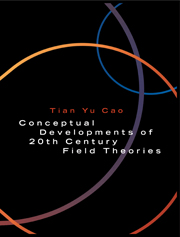Book contents
- Frontmatter
- Contents
- Preface
- 1 Introduction
- 2 The rise of classical field theory
- Part I The geometrical programme for fundamental interactions
- Part II The quantum field programme for fundamental interactions
- Part III The gauge field programme for fundamental interactions
- 9 The route to gauge fields
- 10 The formation of the conceptual foundations of gauge field theories
- 11 The gauge field programme (GFP)
- 12 Ontological synthesis and scientific realism
- Appendices
- Bibliography
- Name index
- Subject index
12 - Ontological synthesis and scientific realism
Published online by Cambridge University Press: 21 January 2010
- Frontmatter
- Contents
- Preface
- 1 Introduction
- 2 The rise of classical field theory
- Part I The geometrical programme for fundamental interactions
- Part II The quantum field programme for fundamental interactions
- Part III The gauge field programme for fundamental interactions
- 9 The route to gauge fields
- 10 The formation of the conceptual foundations of gauge field theories
- 11 The gauge field programme (GFP)
- 12 Ontological synthesis and scientific realism
- Appendices
- Bibliography
- Name index
- Subject index
Summary
The historical study of 20th century field theories in the preceding chapters provides an adequate testing ground for models of how science develops. On this basis I shall argue in this chapter that one of the possible ways of achieving conceptual revolutions is what I shall call ‘ontological synthesis’, and thus propose an argument for a certain kind of scientific realism and for the rationality of scientific growth.
Two views on how science develops
There are many views in contemporary philosophy of science concerning the question of how science develops. I shall consider in particular two of them. According to the first view, science evolves through the progressive incorporation of past results in present theories, or in short, science is a continuing progression. Such a ‘growth by incorporation’ view was taken by the empiricist philosopher Ernest Nagel. Nagel took for granted that knowledge tended to accumulate and claimed that ‘the phenomenon of a relatively autonomous theory becoming absorbed by, or reduced to, some inclusive theory is an undeniable and recurrent feature of the history of modern science’ (1961). Thus he spoke of stable content and continuity in the growth of science, and took this stable content as a common measure for comparing scientific theories. The idea of commensurability was taken to be the basis for a rational comparison of scientific theories.
A more sophisticated version of the ‘growth by incorporation’ view was proposed by Wilfrid Sellars (1965) and Heinz R. Post (1971).
- Type
- Chapter
- Information
- Conceptual Developments of 20th Century Field Theories , pp. 355 - 370Publisher: Cambridge University PressPrint publication year: 1997



